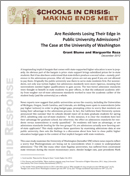There is a longstanding implicit bargain that comes with state-supported higher education: subsidized prices for in-state students, and resident preference in the admissions process.
News reports now suggest that public universities across the country are shifting more spots to nonresidents (who pay higher tuitions) in order to plug budget gaps, prompting critics to worry that residents are losing their advantage in the admissions process.
Do residents still have an advantage, or are admissions standards leveling for the two groups? Or, are admissions actually now favoring out-of-state applicants?
This case study examines admissions data at the University of Washington in order to quantify the effect on admissions standards for residents versus nonresidents. Like many other state flagship universities, the UW has suffered from constrained state revenues during the recent recessionary years. The findings suggest that Washington residents have indeed lost their edge in UW admissions, and in fact may have been at a disadvantage in 2011.
While reflective of one university in one state, the findings raise broader concerns that state-supported universities, if unconstrained by public policy, can act counter to the goals implicit in the bargain that accompanied state support, and that solving budget gaps with nonresidents will weaken the case for state support when state revenues begin to climb.
The report recommends that state lawmakers and administrators move beyond the resident-nonresident tradeoff to look for policy solutions that maintain access for state residents and make progress on solving budget gaps.




